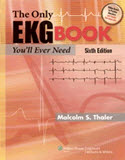Now in its Sixth Edition, this popular, practical text presents all the information clinicians need to use the EKG in
everyday practice and interpret hypertrophy and enlargement, arrhythmias, conduction blocks, pre-excitation syndromes,
and myocardial infarction. It is an ideal reference for medical students in ICM courses, house officers, or anyone
directly involved in patient care, whether student, teacher, or practitioner. The book includes more than 200
facsimiles of EKG strips and numerous clinical cases. This edition features new and updated clinical cases, more
clinically oriented discussions of EKG findings, and expanded coverage of important topics such as the long QT syndrome
and sudden cardiac death.
Table Of Contents
Getting Started
Chapter 1: THE BASICS
Electricity and the Heart
The Cells of the Heart
Time and Voltage
P Waves, QRS Complexes, T Waves, and Some Straight Lines
Naming the Straight Lines
Summary: The Waves and Straight Lines of the EKG
Making Waves
The 12 Views of the Heart
A Word About Vectors
The Normal 12-Lead EKG
Summary: Orientation of the Waves of the Normal EKG
Coming Attractions
Chapter 2: HYPERTROPHY AND ENLARGEMENT OF THE HEART
Definitions
Axis
Summary: Axis
Axis Deviation, Hypertrophy, and Enlargement
Atrial Enlargement
Summary: Atrial Enlargement
Ventricular Hypertrophy
Secondary Repolarization Abnormalities of Ventricular Hypertrophy
Summary: Ventricular Hypertrophy
CASE 1
CASE 2
Chapter 3: ARRHYTHMIAS
The Clinical Manifestations of Arrhythmias
Why Arrhythmias Happen
Rhythm Strips
How to Determine the Heart Rate from the EKG
The Five Basic Types of Arrhythmias
Arrhythmias of Sinus Origin
Ectopic Rhythms
Reentrant Rhythms
The Four Questions
Supraventricular Arrhythmias
Summary: Supraventricular Arrhythmias
Ventricular Arrhythmias
Summary: Ventricular Arrhythmias
Summary: Rules of Malignancy for PVCs
Supraventricular Versus Ventricular Arrhythmias
Summary: Ventricular Tachycardia (VT) Versus Paroxysmal Supraventricular Tachycardia (PSVT) with Aberrancy
Programmed Electrical Stimulation
Implantable Defibrillators
External Defibrillators
CASE 3
CASE 4
CASE 5
Chapter 4: CONDUCTION BLOCKS
What Is a Conduction Block?
AV Blocks
Summary: AV Blocks
Bundle Branch Block
Summary: Bundle Branch Block
Hemiblocks
Summary: Criteria for Hemiblock
Combining Right Bundle Branch Block and Hemiblocks
Summary: Criteria for Bifascicular Block
Blocks That Underachieve
The Ultimate in Playing With Blocks: Combining AV Blocks, Right Bundle Branch Block, and Hemiblocks
Pacemakers
CASE 6
Chapter 5: PREEXCITATION SYNDROMES
What Is Preexcitation?
Wolff-Parkinson-White Syndrome
Lown-Ganong-Levine Syndrome
Associated Arrhythmias
Summary: Preexcitation
CASE 7
Chapter 6: MYOCARDIAL ISCHEMIA AND INFARCTION
What Is a Myocardial Infarction?
How To Diagnose a Myocardial Infarction
Summary: The EKG Changes of an Evolving Myocardial Infarction
Localizing the Infarct
Non-Q Wave Myocardial Infarctions
Angina
Summary: The ST Segment in Ischemic Cardiac Disease
Limitations of the EKG in Diagnosing an Infarction
Stress Testing
CASE 8
Chapter 7: FINISHING TOUCHES
Electrolyte Disturbances
Hypothermia
Drugs
Other Cardiac Disorders
Pulmonary Disorders
Central Nervous System Disease
The Athlete's Heart
Summary: Miscellaneous Conditions
CASE 9
Chapter 8: PUTTING IT ALL TOGETHER
The 11-Step Method for Reading EKGs
Review Charts
Chapter 9: HOW DO YOU GET TO CARNEGIE HALL? (Practice, Practice, Practice!)
Practice EKG Strips
Subject Index


